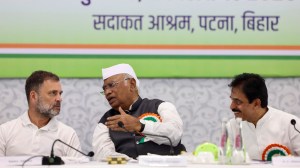Front Page in Feel Good City
Americans have a fine tradition of giving their states and cities colourful titles. California is the Golden State, New Jersey the Garden St...

Americans have a fine tradition of giving their states and cities colourful titles. California is the Golden State, New Jersey the Garden State and Virginia is For Lovers. Similarly, if Los Angeles is the City of Angels, Chicago is, simply, the Windy City. Las Vegas, what else but the Sin City. If we were to launch a similar tradition here, what would we call Bangalore?
You’d be tempted to say something like The City of Nerds (After all, Redmond, Microsoft’s headquarters in Seattle, is often called Nerdburg). Or the City of Beer Drinkers. The Big Mouse (to rival New York, the Big Apple). But, really, Bangalore deserves to be called something like The Good News City. Better still, The Feel Good City. If that title endures, which I suspect it might, you obviously would remember who you first heard it from. (Modesty doesn’t come easy when you’re feeling good).
The weather helps, but there is more to Bangalore’s Feel-Good character than that. The breeze is stiff, carries a nip, gentle as a dash of nimbu in a glass of coconut water and the next moment stinging your face with freshness straight out of a Liril ad.
It’s been raining since last night. Chief Minister S M Krishna, who has been on this weird padyatra to defy the Supreme Court’s order to let some water flow into neighbouring Tamil Nadu, has already hailed this divine intervention. Funny, because not only is he one of India’s better educated and sophisticated politicians, but also because he runs our most high-tech state.
So keen was he on his padyatra that he even stood up Ernst & Young, who had him confirmed as the chief guest at their Entrepreneur of the Year awards here on Thursday night. His political compulsions were never going to impress jury chairman Rahul Bajaj who, in any case, is impossible to faze unless, probably, if you jumped him suddenly with words like ‘Hero Honda’.
The Chief Minister, he said, ‘‘couldn’t be with us because he urgently needed some physical exercise.’’ Everybody laughed, including the man standing in for Krishna, his Industry Minister, R V Deshpande.
WEATHER apart, it’s been raining good news for the past many days in Bangalore. Hotels have been fuller than at any time in the past two years. The flights are chock-a-block, the pubs and restaurants though still a far cry from the boom of 1999-2000 are beginning to fill up. Some new tech start-ups are growing large enough to be noticed; there is just that hint of greening in the tech job market.
Infosys signalled the change with its 225-crore bottomline for the quarter on Thursday, even if Narayana Murthy, in his acceptance speech as the Entrepreneur of the Year, called these results merely ‘‘reasonable.’’
Some in the audience, still struggling to wipe blotches of red from their balance sheets, wondered why he had to be so sadistically modest. Or how he was going to ‘‘let India down’’ if he spoke the same self-deprecating language at the world event in Monte Carlo. What is subtle, self-effacing southern Brahmin charm here may be lost on hard-boiled trans-national corporate smoothies, who would be judging a kind of Mister Corporate World contest at Monte Carlo.
There was, in any case, consensus that Murthy was the wrongest man to be sent to that hot-spot. That the charms and delights of Monte Carlo will be so thoroughly wasted on someone as frugal and modest. But you can’t quibble with his turnaround results for the quarter. And if, as is the norm, Infy sets the trend in the tech business, this may be the first real whiff of the return of the good times.
Happily, while the weather gods may have only smiled on Bangalore, it seems the Bangalore Effect these days isn’t such a local phenomenon. It ranges in width from the voters in Kashmir defying the gun to win their ‘azadi’ from the Abdullahs, thus confirming their return to the mainstream at least in terms of sharing the pan-Indian anti-incumbency wave, to our hockey team once again beating Pakistan and athletes picking up Asian Games medals as they haven’t in two decades.
The most ominous cloud over our economy, the sabotage of public sector privatisation, is beginning to clear. After Akshardham, we have shown the world how every outrage does not need to have the fallout of a Godhra. Even the belatedly released Census data has shown that the fall in birthrates has been steeper than even our most optimistic projections.
When was the last time you had such a flood of good news? Actually, while it helps to be in perky Bangalore, you cannot escape that feel-good sense anywhere. And don’t let minor distractions bother you as you savour these rare moments. Who, for example, would bother in this marvellous phase about pinpricks like the Gujarat government denying advertising to only this newspaper.
Little men are entitled to little pleasures, even if they come from the poor taxpayer’s money.
SO, cut back to happier images. Victory processions in the Valley, so many Indian sportsmen raising their arms in celebration, even cherish the delicious dilemma of a BJP defending its polarised stance in Gujarat hoping it will win them elections there, while it unabashedly celebrates its own, and its ally’s defeat in Kashmir.
The last time you saw such a paradox was in Assam of 1985, when the Asom Gana Parishad swept aside the Congress after a peace accord with Rajiv Gandhi that ended a decade of violence and vicious alienation. The Assamese slogan in that election was, ‘Congress murdabad, Rajiv Gandhi Zindabad’. Rajiv, and his partymen were meanwhile celebrating victory in that defeat as Vajpayee and Advani must be doing right now.
When the chips are down, our politicians still have the good sense to put national interest above party interest.
OR spare a thought for another class of Indians, despised only a little less than our politicians — the government servants. You remember them usually, and unlovingly, as inefficient, corrupt, cynical, clumsily dressed masters of our destiny that we encounter in the income tax office or the collector’s court, the civil hospital, the offices of your housing, electricity, water boards and other instruments of state tyranny.
You know them for doing nothing but gossiping in dirty, messy, power-less, smelly offices, sometimes down to their undervests. They usually make news when they go on strikes or bandhs or resort to such swadeshi monstrosities as ‘work to rule’ agitations.
But come a Kumbh, a Bhuj earthquake, an Orissa supercyclone or a Kashmir election, and the same people deliver in a manner that would dazzle even a First World establishment. No surprise then that the same people so willingly put on 22-kg bullet-proof jackets and helmets and risked their lives in what is arguably a more dangerous part of the earth than Bethlehem or Baghdad, Jerusalem or Jericho today, to give us the gift of this remarkable election.
These nameless, unsung, poorly-paid marginal men are still willing to rise to the call of duty when they are convinced of its nationalist intent.
When people you usually hate so much, the politicians and the civil servants, combine to give you so much good news, it is only in the fitness of things that our sportsmen have not stayed behind.
But again, underline what has made the difference. In the past decade, as sport has become more commercial and as sponsorship and television have become a much larger source of income than government largesse, sports associations and their dreaded officials have also been forced to submit to the will of the market: performance counts.
If you win more, make your countrymen happier, more of them will watch you, they may even buy the shampoo you endorse or the credit card you use.
I’m sure that all this sounds a bit rosy, that there must also be some bad news that I’m glossing over. But it’s okay because we journalists are usually accused of overlooking the good news, instead. Maybe I’m overstating the good news, the feel-good factor. It could be because it is the beginning of the festive season.
Or maybe it’s merely to do with being in Bangalore, the Feel Good City. Even if I’ve missed my flight and am cooling my heels for four hours. I am not complaining.
Write to sg@expressindia.com
Photos


- 01
- 02
- 03
- 04
- 05





























